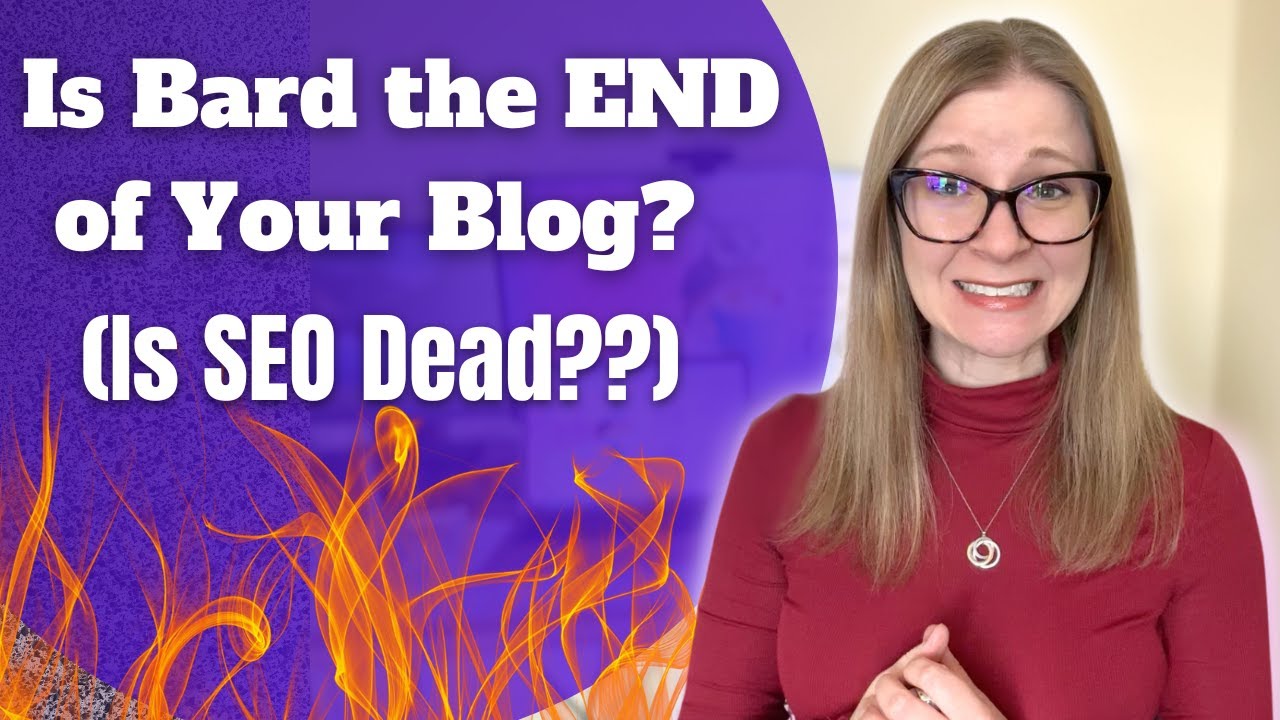Is Google’s Bard AI Going to END Your Blog? Is SEO Dead in 2023?
Once again, people have been crying
from the mountaintops that SEO is dead, or at least it soon will be. The assailant?
Google's Bard. But what is Bard? Why are bloggers so panicked about it? And is it actually
going to end SEO? Today's video will explore some of the answers to these questions and hopefully
provide you with enough comfort that you don't wind up having nightmares about Shakespearean
robots sending your content Up in flames. If you're new to my channel, my name is Corrie.
I'm a writer, blogger, and content creator, and it's my mission to share with you everything
I know about how to make money online with your content and the best tools for doing
so.
First things first: What is Bard? Bard is a conversational AI bot developed by
Google. Powered by LaMDA, it's designed to simulate natural conversations with users
and provide them with accurate answers to their questions. And it's safe to assume that
this was launched in response to competitor AI Bots coming onto the market, such as ChatGPT.
When Google Bard rolls this out, users will be able to ask questions using natural language and
receive detailed answers from the AI-powered chat bot. Now, Bard is still not quite ready for prime
time, and it actually made Headlines by blundering pretty badly in the demo the other day. But it
won't be long before they fine-tune this thing and make it available to everyone. So what does this
mean for bloggers? It means that in many cases, users will no longer have to comb through the
search results pages to get the answers they need. They're not going to need to click through to
your website because Bard is going to be providing a customized, detailed answer for them.
And less
clicks of course means fewer views and, therefore, fewer conversions and less ad revenue. So, you can
see why a lot of people are panicking about this. And that's why the claim has come back yet again
that SEO will be meeting a swift end in the coming months and years. But is this really true? No, not
really. First of all, people have been predicting the end of SEO since the 90s, which is almost
as long as it's even been around. And yet SEO perseveres year after year. And that's because SEO
never really dies but it does change. And indeed, Bard is going to change the SEO game in a big way.
And certain types of content are probably going to see a lot less traffic than they did before.
But Bard isn't going to end all search traffic because there are still some queries that it's
not going to be able to answer as effectively as you can.
So let's start out what kind of content
is most likely to be affected and what you should be leaning more of your efforts towards in the
future. The kind of content that's going to get hit the hardest is informational posts that are
designed to answer a specific question with facts. So, one way to think of it is if your blog post
is something that people could find and the people also ask section of the SERPs, it's probably
going to get hit by Bard. And I'm not gonna lie, that's kind of a bummer because for years,
informational posts were a great way to build your Authority in your Niche and a lot of those
were low-competition, long-tail keywords. So for example, my blog post, "signs you are gaining
muscle," right now I'm ranking right at the top of Google for this keyword. And it's been bringing
in lots of yummy traffic for almost a year now. But let's say after Bard rolls out – and for the
purpose of this demonstration, let's use ChatGPT and just pretend it's Bard – and a user searches
for this exact query, well, ChatGPT came up with an answer that's detailed enough that maybe the
user doesn't really need to look at the SERPs.
And the main way that this will be different from
ChatGPT is that Bard will be able to provide answers that contain recent information. So even
if a user searches for something like, let's say, a list of the 50 top-grossing movies in 2023, then
Bard is going to be able to give them an accurate, up-to-date answer that once again, negates the
need for a click. The small Silver Lining to this is that informational content is typically not the
most profitable type of content as a blogger.

Many of the searches that lead to such articles don't
really have buyer intent, so it's a lot harder to monetize them with affiliate links and products.
So most of my informational posts only make money through display ads. And again, there are
exceptions to this, but in general, straight-up informational content is probably going to get hit
the hardest. So, what kind of content will be safe from Bard? And here's where we kind of come back
to the heart of every successful blog that uses SEO, which is unique content that showcases your
own expertise and experiences, except now that's going to be more important than ever before.
One example of that kind of content is reviews. Reviews are arguably the most profitable type of
blog posts because when people search for product or service reviews, they have buying intent.
They
want to know if it's good before they drop money on it. And I guarantee you that they are not going
to want to take some AI robot's word for it. Heck, I don't even trust Amazon reviews anymore. I
don't want a one or two-sentence summary on a product. No, I want to see an in-depth analysis
by someone who clearly has experience using it. I want pictures, videos, outcomes, pros and cons, I
want all of it. And Bard is never going to be able to provide that with any degree of authenticity.
This also includes group roundup review posts, so blog posts like the "10 best watches that
are under $200," "the best camping chairs for summer," stuff like that.
So that's also probably
going to be safe from Bard. So the good news is, there's no need to mourn for lost Amazon Associate
sales just yet. Another kind of blog post that's likely safe from Bard is detailed how-to articles.
Now, if it's something really basic like how to tell if your chicken is cooked, then Bard is
probably going to be able to answer that pretty effectively. So you want to focus on more in-depth
how-to articles like, "how to crate train your puppy in a week," or "how to invest your money
when you're on a budget," stuff that's actually going to take more than a couple of paragraphs to
explain and stuff that will benefit from visual aids like pictures, infographics, videos, Etc.
If you're a food blogger, then you're probably also safe because when people want a recipe
for tiramisu or something like that, I doubt they're going to go with an AI's suggestion
because they're going to want to see tried and true recipes that have good reviews and detailed
instructions with pictures. So these are the best examples of the kind of content that Bard isn't
really going to be able to emulate.
So in general, we're talking about content that's maybe a little
bit subjective and requires a human's voice and experience. So knowing all that, how do we prepare
for the rollout of Bard? Here's what I'm going to do. So obviously, I'm going to lay off the basic
informational posts. So this is actually a bit of a bummer because I have like, three blog posts
that have been sitting in my Google Drive for like a month, which I just haven't gotten around
to polishing up and Publishing. But once I do Post those, I'm not going to Target these so much
anymore because they're just probably not going to get a ton of traffic for the long term.
Instead,
I'm going to focus more on reviews and content with buyer intent. So back in the day, I used to
write a lot of reviews for fitness apps and gym products and stuff like that. So that's going to
become my main area of focus once again. I'm also going to do comparison content by comparing two
different products with each other, that kind of thing. Last but not least, I'm going to look at
my existing content and ask myself, "how can I make this better?" Does it need updating? Could it
use more visuals? Can I add a video? Could I add more of my own personal anecdotes or experience
on the topic? So that's my view on the whole Bard versus SEO. If you have any questions or
comments, be sure to leave them below. In the meantime, I hope you found this helpful and that
it prevents any nightmares about The Bard. [Music].



